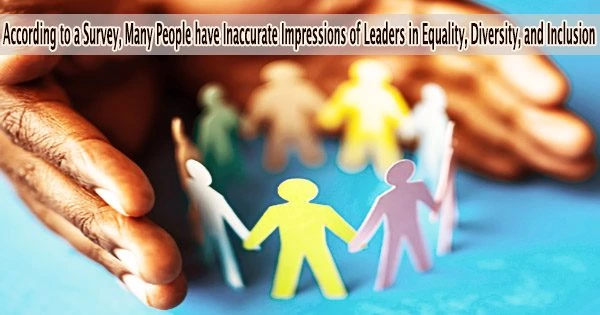Companies in North America have been focusing more on promoting equity, diversity, and inclusion (EDI) over the past ten years. This has led many firms to establish a leadership position wholly committed to developing EDI, as seen by the 107 percent rise in “head of diversity” job postings on LinkedIn between 2015 and 2020. By 2021, more than half of S&P 500 firms had named a chief diversity officer.
However, a recent study from the UBC Sauder School of Business reveals that many people hold strongly held opinions about the type of person who should lead an EDI team that are based on racial prejudices.
A news release introducing a new leader at a hypothetical company was distributed to 500 participants for the study, which was published in the Journal of Applied Psychology. Some individuals were informed that the new leader was the head of finance, while others were informed they were the head of EDI. They were then asked to list the qualities that leaders in such roles should possess, as well as what race they thought the leader should be.
“We found that, even though the new leader had a generic name and description, people were significantly more likely to assume the finance leader would be white, while the EDI leader would be non-white,” says UBC Sauder assistant professor Dr. Rebecca Paluch, who co-authored the study with Dr. Vanessa Shum, assistant professor of business administration at California State University San Marcos.
In a second experiment, researchers questioned participants about the characteristics that they connected with various racial groupings and leadership positions. They discovered that not only did respondents believe non-white people were more likely to be social justice advocates and to have dealt with discrimination, but they also believed these qualities were essential for effective EDI leadership.
The researchers’ third study looked at how recruiting managers assess potential EDI leaders based on information in a candidate packet. They discovered that hiring supervisors preferred non-white candidates over white ones because they believed they have superior leadership skills for the position.
Because we find a racial bias for the EDI leader role, it’s particularly important not to downgrade the status or necessity of this role, particularly in comparison to other leader roles. Organizations should make sure they’re giving EDI leaders the same type of resources, prestige and attention as other leaders in the organization. Just like a Chief of Operations or a Chief of Finance, EDI leaders should be guaranteed a seat at the table.
Dr. Rebecca Paluch
This was due to hiring managers’ assumptions that non-white candidates would be more social justice-minded and would have encountered prejudice, findings that are similar to those from the second trial.
“We were surprised by how strong the findings were,” says Dr. Paluch, who links the results to Role Theories, which suggest people associate certain groups with particular occupations because of their past and current experiences.
“For decades, researchers have found that people often expect business leaders to be white and believe white employees are more likely to possess traits required for successful organizational leadership.”
“Although historically business leaders have traditionally been white, which drives that association between being a leader and being white, social justice movements or diversity initiatives have historically been driven by non-white leaders or groups.”
Dr. Paluch says the findings are promising in that they represent a shift in people’s perceptions of who leaders are. What’s more, when they see non-white people in EDI leadership roles, they will be more likely to expect non-white leaders in other top corporate spots as well.
At the same time, the study reveals continued race-based stereotyping in hiring, adds Dr. Paluch, and as a result, EDI roles risk being perceived as less important. In fact, many businesses have already started reducing or eliminating EDI leadership spots as they look to cut costs.
“It’s never good to hire based on biased presumptions. We can’t assume things about people just because of the way they look,” she says. “Those biases could ultimately hurt equity, diversity and inclusion in the long run, particularly if there are racial minorities in the role.”
Dr. Paluch says leaders need to understand that discrimination is often built into employment systems. They are more inclined to implement accountability measures and standardize recruiting procedures once they are aware of these prejudices.
Additionally, they must give priority to equality, diversity, and inclusion; recognize the importance of EDI leaders on the management team; define their responsibilities clearly; and fairly compensate EDI leaders.
“Because we find a racial bias for the EDI leader role, it’s particularly important not to downgrade the status or necessity of this role, particularly in comparison to other leader roles,” she says.
“Organizations should make sure they’re giving EDI leaders the same type of resources, prestige and attention as other leaders in the organization. Just like a Chief of Operations or a Chief of Finance, EDI leaders should be guaranteed a seat at the table.”
















